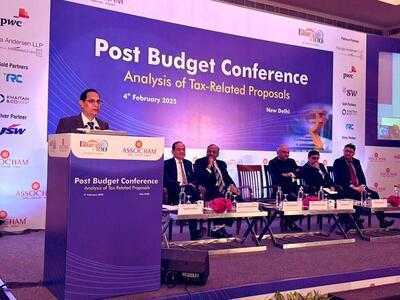
Tax reforms are a key feature of the Union Budget, as it has an impact on what the rest of the economy does and for the first time have been included in Part-A of the budget, Finance Secretary Tuhin Kanta Pandey said on Tuesday.
"A high level of taxation is counterproductive, and we have taken the bold step of not increasing taxes. Our direction is clear, expand the tax base, expand the economy and the taxes will also flow," Pandey said in his address at the ASSOCHAM post-budget conference.
"We had a 20-25 per cent growth in personal income tax over the last three years. We don't really gain loading taxes very much on the same taxpayers," he explained.
He said the emphasis was on the need to create a wider avenue for income generation and an environment of voluntary compliance.
"Budget making is actually balancing different imperatives and never an exercise in segments," he remarked.
Pandey further stated that the Bharat Trade Net announced in the budget will connect all stakeholders and streamline the customs process and has the potential to be much more than UPI.
"It's no longer a question of following standards; our concept of GST has no parallel in the world and we must take pride in what we all have achieved" he added.
Ravi Agrawal, Chairman, of the , (CBDT), Ministry of Finance said, "The approach of the Tax Department has changed over a period of time. The guiding philosophy is that it is not just about collecting taxes and that tax is basically a derivative of a part of the income, you generate income and then automatically taxes come. The amendments in the Direct Tax Act, change in the tax slabs and rebates has been approached with that perspective."
He pointed out that rationalising TDS and TCS provisions, decriminalising those provisions, and the concept of updated returns contained in the budget are aimed at facilitating ease of doing business.
The CBDT chairman highlighted that the government was adopting a prudent approach of being proactive, rule-based, user-friendly, data-driven and non-intrusive with an enabling environment and technology-driven transparent tax administration.
Sanjay Kumar Agarwal, Chairman, of the Central Board of Indirect Taxes & Customs, (CBIC) said, "The customs duty rate rationalisation has been conducted in respect of 8,500 tariff lines out of 12,500 tariff lines pertaining to industrial goods. Agriculture goods and textiles have not been touched due to their highly sensitive nature. These rates have remained unchanged for almost two decades and there is a perception that India has very high rates. Rates have been now rationalised to 20 per cent which were between 70 to 20 per cent and those which were above 70 per cent have been brought down to 70 per cent. The equivalent amount of EIDC has been imposed to keep the effective duty incidents at the same rate or a slightly lower rate. So, that shock is absorbed gradually."
In the welcome address focused on .' Manish Singhal, Secretary General, ASSOCHAM, lauded the government for aligning Union Budget 2025-26 with public expectations while ensuring fiscal prudence. The introduction of significant tax relief for the middle class is expected to stimulate economic growth by enhancing savings and consumption.
Additionally, he emphasised the government's commitment to fostering a business-friendly environment through ease-of-doing-business initiatives and financial deregulation, which will support sustained business expansion.
(With inputs from IANS)